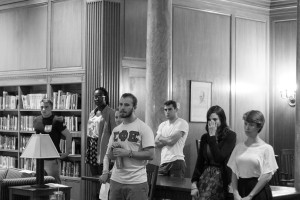 On a cloudy Sunday afternoon, the Sigma Phi Epsilon house is almost empty. On the porch sits a gaggle of guys on hard chairs and an old black couch, dressed in Sunday casual. A slight breeze blows, drizzling a few raindrops into their faces. Three have their eyes glued to their computers, frantically creating an event on Facebook, taking notes for the meeting, and referencing a recently created constitution.
On a cloudy Sunday afternoon, the Sigma Phi Epsilon house is almost empty. On the porch sits a gaggle of guys on hard chairs and an old black couch, dressed in Sunday casual. A slight breeze blows, drizzling a few raindrops into their faces. Three have their eyes glued to their computers, frantically creating an event on Facebook, taking notes for the meeting, and referencing a recently created constitution.
Updates on progress from the past week are shared and plans for the following week are made. These men are determined to accomplish their goals and have broken down a large task into military-like moves that will allow them to reach their ultimate goal: the changing of the sexual assault culture on campus.
This is a meeting of the executive board of Men Opposed to Violence Everywhere (MOVE), a new group on campus dedicated to creating programming for all male groups. The goal is to give men a safe space to talk about sexual assault and have discussions about the cultural problems they face everyday regarding sexual assault and the objectification of women.
The group is not looking to be approved as an SA organization. Instead, they work closer with the Director of the Center for Student Conflict Management Kyle Orton, who strongly supports their endeavors.
The roots of the group can be found in administrator discussions that occurred last spring, specifically relating to the revised sexual assault policy on campus. Students in the group participated in some of these discussions and decided that no one was better suited to start the conversation with male students than other male students who can directly relate to their struggles.
After a summer of emails and a few Google Hangout sessions, a constitution was written and the group was formed. Even though the group is only a few weeks into face-to-face meetings and being a presence on campus, MOVE has pushed ahead with planning and involvement. “It’s already been pretty intense,” senior and vice president of programming development Michael Silverstein said.
The two main goals of the group are advocacy and outreach. They want to encourage males to explore the sexual assault culture by digging deeper and thinking about their identity, both as individuals and as groups.
Workshops led by the executive board members will explore and discuss the values held by various groups, whether they are sports teams or fraternities. Silverstein and the other members of MOVE are confident an exploration like this will make men at the training realize why this issue is important.
“[The organization’s] values are probably already against sexual assault,” Silverstein said.
Some may wonder why females are excluded from these identity exploration workshops and discussions. The group members have learned from their own experiences and from talking with Orton that men often need a safe space to have these kinds of conversations.
“We have realized that there are a plethora of men trying to make change, but don’t feel completely comfortable talking about these issues with women present,” Silverstein said. “We hope to provide a space for men to talk about these issues.” But members of the board are adamant about welcoming women to the planning team for these outreach events.
“We want to include all viewpoints,” senior and president David Markakis said MOVE will quickly become a common name on campus – the group is planning to cosponsor events in the coming weeks and will hold its general interest meeting this Saturday, Sept. 27 at 2pm in Friel Lounge.
They hope to begin training with teams and other all-male groups within the next month. With its focus on advocacy and outreach targeted towards men, this group is well on its way to making positive changes in the UR culture.
Sanguinetti is a member of theclass of 2015.




